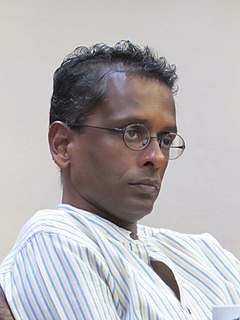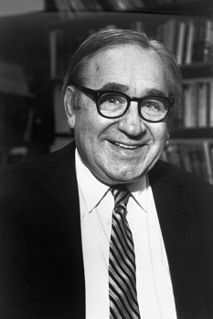A Quote by George Friedman
By the 20th century, war ceased to be an encounter between two armies. It became an encounter between two societies, because a factory worker producing a gun or a bomb is as deadly as a pilot.
Related Quotes
Every human encounter is the external embodiment of an attraction between two magnetic fields. The encounter comes suddenly, unexpectedly. It is a moment of truth. It is a moment of revelation, as when the right ray of sun penetrates through the right window pane, and falls with the right slant on one picture in the museum.
One of the three big factors that count against war in the relationship between China and the U.S. are, first, nuclear weapons and even a condition of mutual assured destruction. Secondly, one's got two economies that have become so deeply interlaced that a war between the U.S. and China would leave Wal-Marts empty and Chinese factories producing for nothing. Thirdly, climate - if between the two of us, we keep doing what we're doing, we can create a climate in which our grandchildren won't be able to live.
The different American experience of the 20th Century is crucial because the lesson of the century for Europe, which essentially is that the human condition is tragic, led it to have a build a welfare system and a set of laws and social arrangements that are more prophylactic than idealistic. It's not about building perfect futures; it's about preventing terrible pasts. I think that is something that Europeans in the second half of the 20th century knew in their bones and Americans never did, and it's one of the big differences between the two Western cultures.
No scientist knows the world merely by holding it at arm's length: if we ever managed to build the objectivist wall between the knower and the known, we could know nothing except the wall itself. Science requires an engagement with the world, a live encounter between the knower and the known. That encounter has moments of distance, but it would not be an encounter without moments of intimacy as well. Knowing of any sort is relational, animated by a desire to come into deeper community with what we know.
I'd love if people relearned the lessons of the 20th century all over again. Which is to say this country progressed economically and socially when we had a better balance between capital and labor. Neither capital or labor won every argument. The battle between the two created economic tension, and transformed the working class into the middle class, and grew the economy.
When you see love between two persons, something is flowing, moving, changing. When there is love between two persons they live in an aura, there is a constant sharing. Their vibrations are reaching to : each other; they are broadcasting their being to each other. There is no wall between them, they are two and yet not two - they are one also.
We see that there are two different kinds of...societies: (a) parasitic societies and (b) producing societies. The former are those which live from hunting, fishing, or merely gleaning. By their economic activities they do not increase, but rather decrease, the amount of wealth in the world. The second kind of societies, producing societies, live by agricultural and pastoral activities. By these activities they seek to increase the amount of wealth in the world.
Neither theological knowledge nor social action alone is enough to keep us in love with Christ unless both are proceeded by a personal encounter with Him. Theological insights are gained not only from between two covers of a book, but from two bent knees before an altar. The Holy Hour becomes like an oxygen tank to revive the breath of the Holy Spirit in the midst of the foul and fetid atmosphere of the world





































